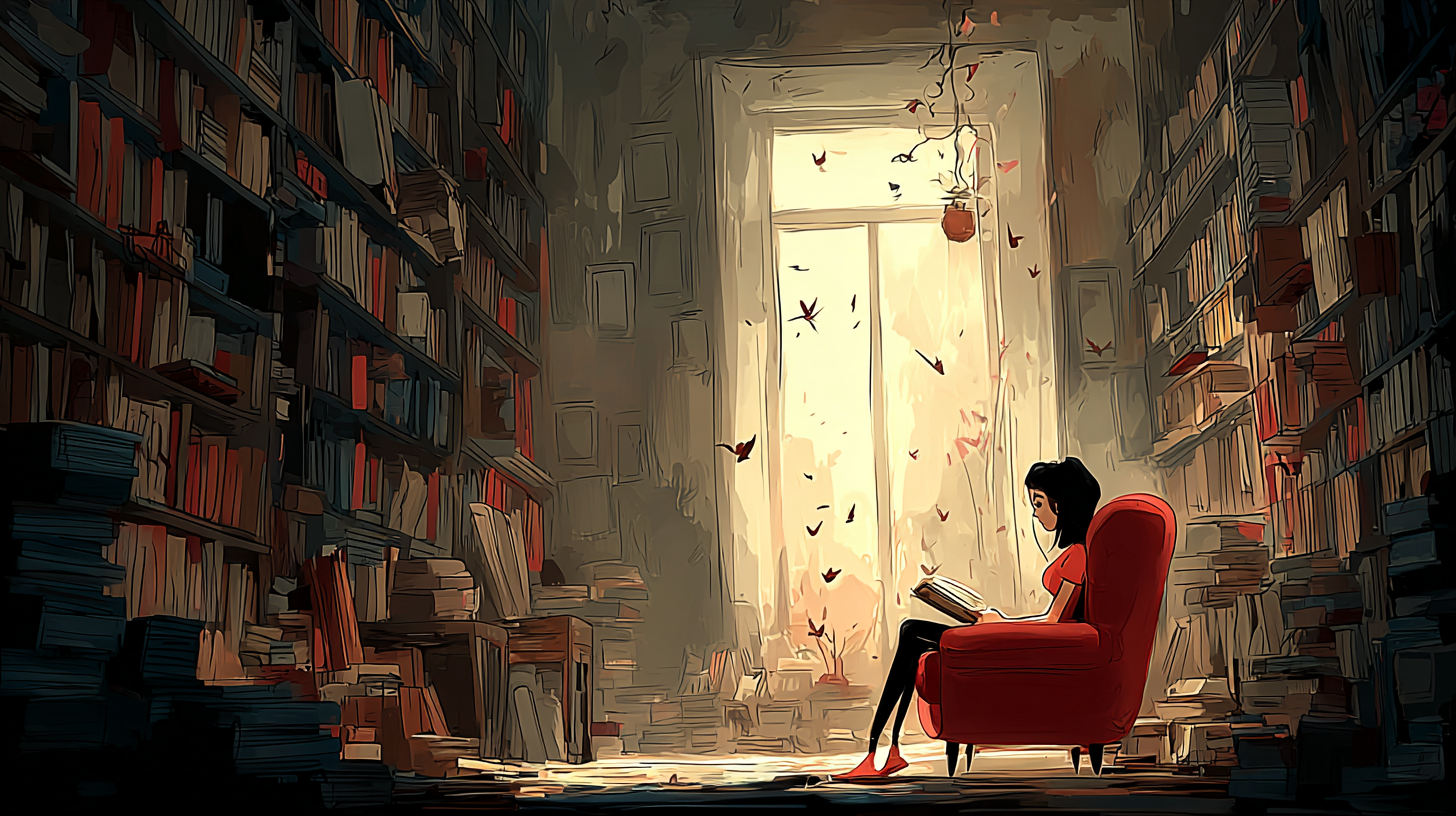Literature means written works like stories and poems.
文学とは、小説や詩などの書かれた作品のことです。
以下は英単語 “literature” に関するストーリー型学習コンテンツです。まずは大枠の意味を理解して最後の文章で確認しましょう。
主な意味(main meaning)
| 品詞 | 意味 | 発音記号 | 例文 |
|---|---|---|---|
| 名詞 | 書かれた作品全般、特に芸術的・学術的価値のある文章(文学) | /ˈlɪtərətʃər/ または /ˈlɪtrətʃər/ | She studied English literature at university. |
語源(etymology)
語源:ラテン語 “litteratura”(文字を書くこと、書かれたもの)から
核となるイメージ:書かれた言葉による表現、特に芸術性をもつ作品
類義語(synonyms)
| 類義語 | 例文 |
|---|---|
| writing | His writing has inspired many young authors. |
| fiction | She prefers reading fiction to non-fiction. |
| prose | The book is written in beautiful prose. |
| poetry | He enjoys reading classical poetry. |
| publication | The new publication includes essays on modern literature. |
反義語(antonyms)
| 反義語 | 例文 |
|---|---|
| speech | Unlike literature, a speech is usually spoken, not written. |
| conversation | A conversation is not considered literature because it’s not structured writing. |
コロケーション(collocations)
| コロケーション | 例文 |
|---|---|
| classical literature | Classical literature is often taught in high schools. |
| modern literature | Modern literature reflects today’s social issues. |
| children’s literature | Children’s literature includes picture books and fairy tales. |
| world literature | He is interested in world literature from different cultures. |
| literary work | That novel is a famous literary work in France. |
2項表現(binomials)
| 2項表現 | 例文 |
|---|---|
| literature and art | She has always loved literature and art since childhood. |
| books and literature | The library is a place full of books and literature. |
英語ストーリー(english story)
Title: Anna’s New World of Literature
Anna had just started working at a local publishing company. Although she studied business in college, her true passion was literature. She loved reading classical literature and spent hours in the library as a child. One day, her manager asked her to assist in editing a new literary work by a young author.
The book was a collection of short stories. Anna read the manuscript and was surprised by the author’s beautiful prose and deep understanding of human emotions. She thought, “This is not just fiction; it’s true art.”
While editing, Anna also found herself writing comments and suggestions. Her writing was clear and thoughtful. The author later said, “Your ideas helped me improve my stories a lot. Thank you!”
That experience changed Anna. She decided to take a night class in modern literature and even started writing her own poetry. She discovered that literature and art were not just hobbies but could become her future.
As she walked home one night, she thought about all the books and literature that had inspired her. Now, she was ready to become a part of that world.
和訳
タイトル:アンナの新しい文学の世界
アンナは地元の出版社で働き始めたばかりだった。大学ではビジネスを学んだが、彼女の本当の情熱は**文学(literature)だった。彼女は古典文学(classical literature)**を読むのが好きで、子どもの頃から図書館で何時間も過ごしていた。
ある日、マネージャーが若い作家の新しい**文学作品(literary work)**の編集を手伝ってほしいと言った。
その本は短編小説の集まりだった。アンナが原稿を読むと、作家の美しい**散文(prose)と人間の感情への深い理解に驚かされた。彼女は「これはただのフィクション(fiction)**ではない、本物の芸術だ」と思った。
編集をしながら、アンナはコメントや提案も書き始めた。彼女の**文章(writing)**は分かりやすく、思いやりがあった。作家は後に言った。「あなたのアイデアは私の物語をすごく良くしてくれました。ありがとう!」
その経験はアンナを変えた。彼女は**現代文学(modern literature)の夜間クラスに通い始め、自分でも詩(poetry)**を書き始めた。文学と芸術は単なる趣味ではなく、自分の未来になり得ると気づいた。
ある夜、家に帰りながら、今まで自分を感動させてきた**本や文学(books and literature)**のことを考えた。今、彼女はその世界の一部になる準備ができていた。
Q&A
- Q「literature」と「writing」はどう違いますか?
- A
「writing」は「書くこと」や「書かれたもの」全般を指す一般的な言葉です。メールや日記、説明文なども含まれます。一方、「literature」は芸術性や価値がある文章、特に小説や詩などの「文学作品」に限定されます。
- Q「literature」と「fiction」はどう違いますか?
- A
「fiction」は空想で作られた物語(フィクション)を指し、小説や短編などが含まれます。つまり「fiction」は「literature」の一部です。「literature」はノンフィクション(事実に基づいた文章)も含むもっと広い言葉です。
- Q「literature」と「prose」はどう違いますか?
- A
「prose」は詩(poetry)ではない、通常の文体で書かれた文章を指します。つまり、小説やエッセイなどの形式です。「literature」はその中で特に芸術的・文化的価値のある作品を表す言葉で、「prose」は文体の種類を指します。
- Q「literature」と「poetry」はどう違いますか?
- A
「poetry」は「詩」のことを指します。「literature」は詩も含む広い意味の言葉で、小説、エッセイ、戯曲などすべてを含みます。つまり「poetry」は「literature」の一部です。
- Q「literature」と「publication」はどう違いますか?
- A
「publication」は「出版物」という意味で、本や雑誌、新聞など、印刷またはデジタルで公に発表されたもの全体を指します。「literature」はその中でも、芸術的・文化的価値のある「文学作品」のことです。すべての出版物が文学とは限りません。
- Q「classical literature」と「modern literature」はどう違いますか?
- A
「classical literature(古典文学)」は昔書かれた、長く読み継がれてきた文学作品を指します。シェイクスピアや夏目漱石などが例です。一方、「modern literature(現代文学)」は比較的新しい時代に書かれ、現代社会や人間を描く作品を指します。
- Q「children’s literature」と「literature」はどう違いますか?
- A
「children’s literature(児童文学)」は子ども向けに書かれた文学作品です。やさしい表現や教育的内容が特徴です。「literature」は子ども向けかどうかに関係なく、あらゆる年齢層に向けた文学全体を指します。
- Q「world literature」と「literature」はどう違いますか?
- A
「world literature(世界文学)」は、世界中の国々で書かれた文学を含みます。つまり、視野を広げて他国の文学作品も含めて読むときに使います。「literature」は国籍に関係なく文学全体を意味しますが、「world literature」は特に多様な文化の文学を強調するときに使います。
- Q「literary work」と「literature」はどう違いますか?
- A
「literary work」は「1つの文学作品(小説、詩、戯曲など)」を指す具体的な言葉です。一方で「literature」は文学全体やジャンルを指す抽象的な言葉です。



コメント